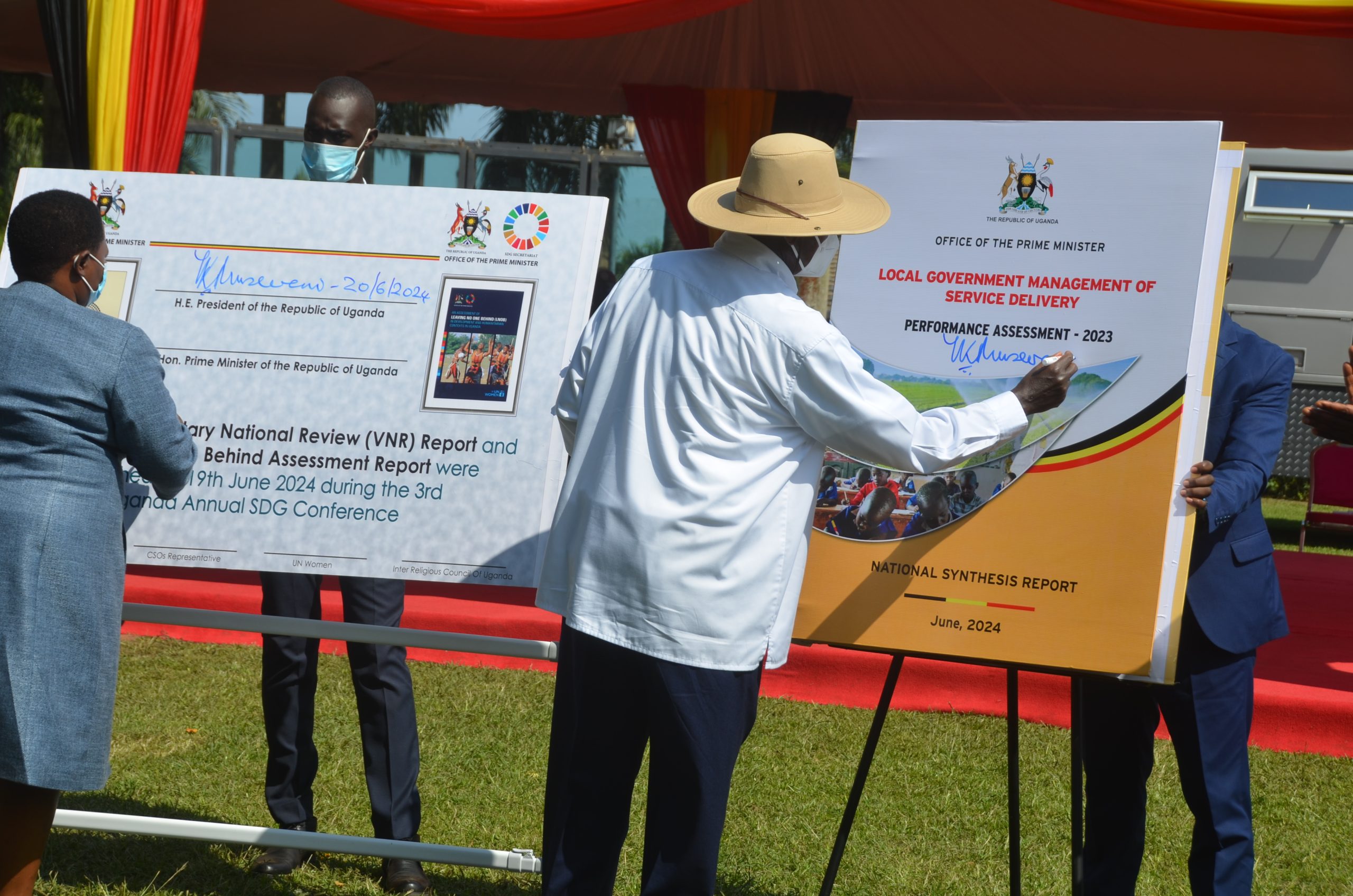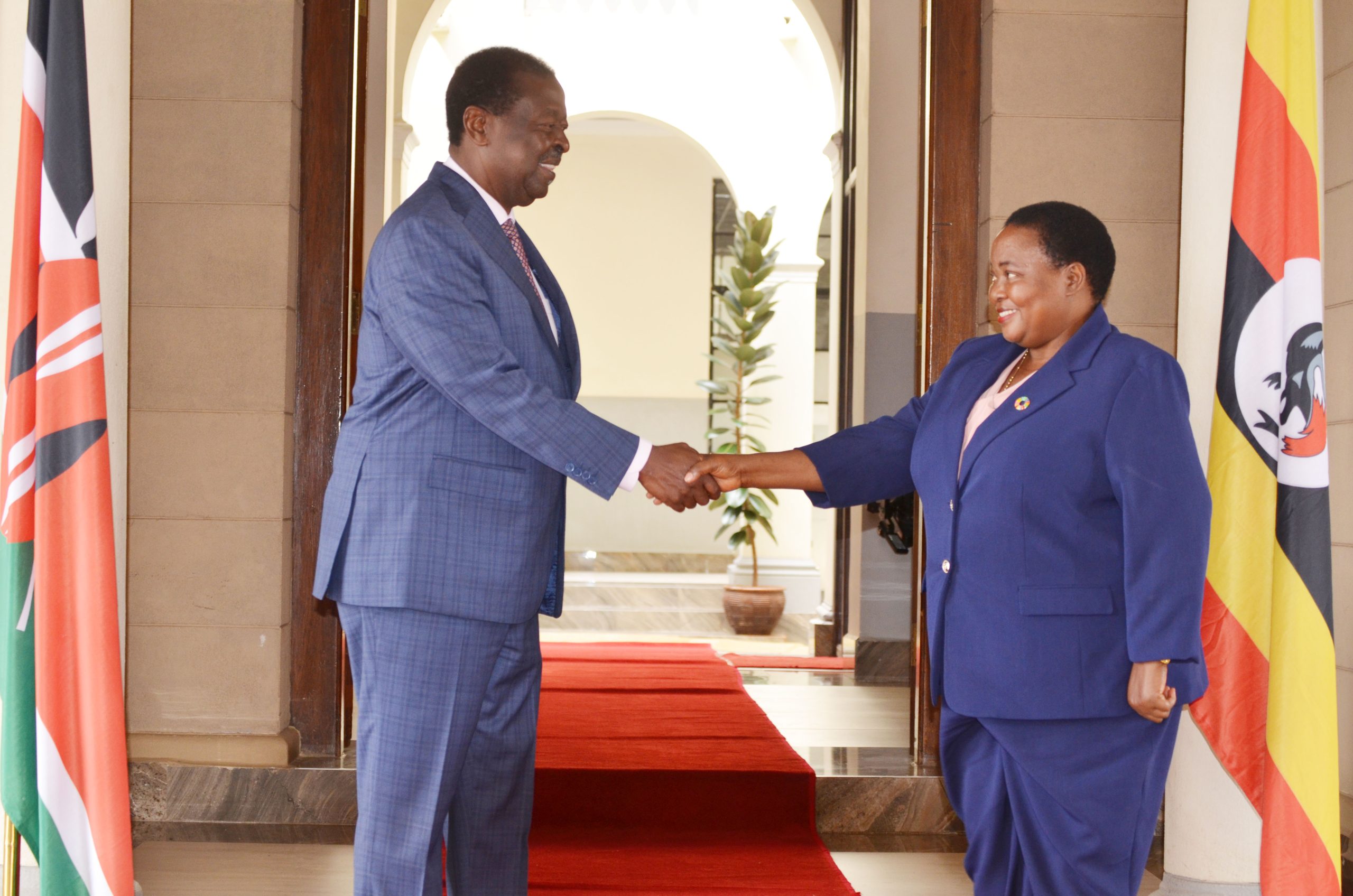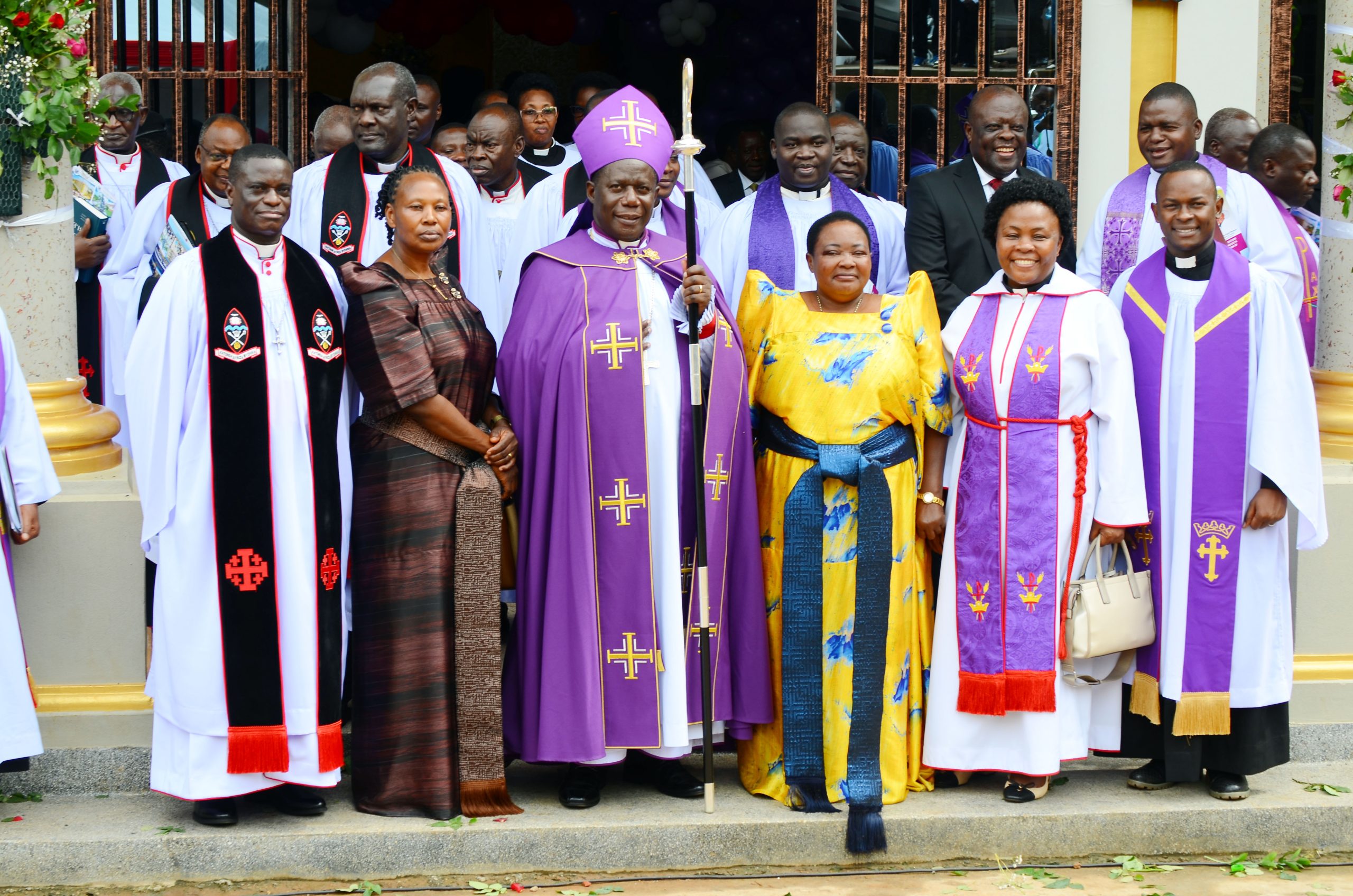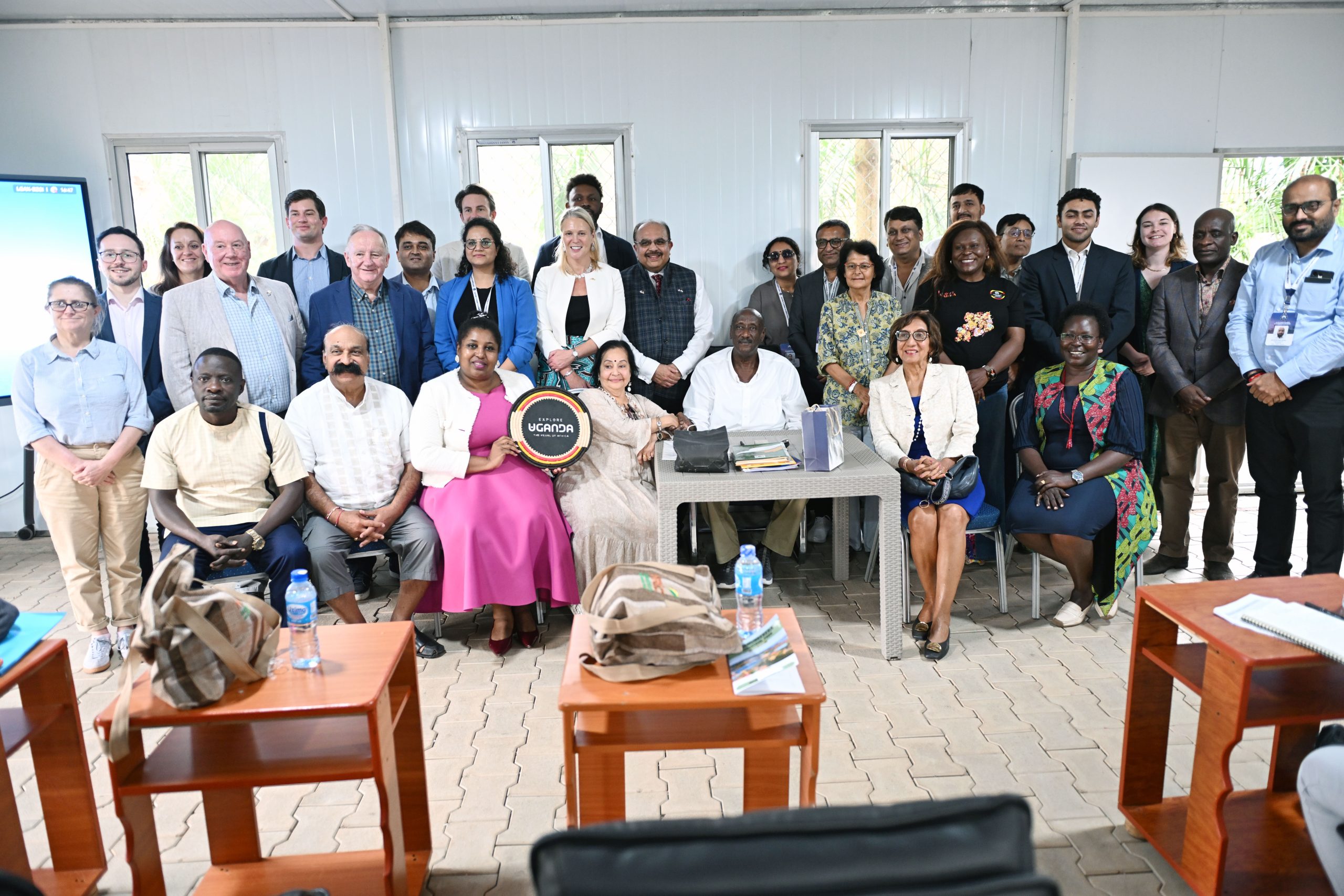By: Ismael Kasooha
KAMPALA
President Yoweri Museveni noted that attaining the sustainable development goals (SDGs) requires societies to undergo socio-economic transformation.
Uganda held its third SDGs conference on 19 – 20 June 2024 at Speke Resort and conference center Munyonyo under the theme: “Strengthening Localization and Service Delivery Mechanisms for National Development and SDG Acceleration and Transformation.
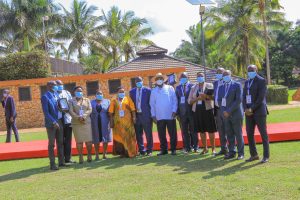
President Yoweri Museveni, in a hut, stands with ministers and local government officials who excelled under the local government service delivery assessment findings
President Yoweri Museveni was the Chief guest at the closure of the two-day conference attended by Resident District/City Commissioners (RDCs/RCCs), District Chairpersons, City and Municipal Mayors, Government Officials, Development Partners, Private Sector, among others.
The SDGs are the blueprint to achieve a better and more sustainable future for all. They address the global challenges the world faces including those related to poverty, inequality, climate change, environmental degradation, peace and justice.
The President said, “if you look at my speech sometime back, I told some people that in my view, there is no way you can get those SDGs without socio-economic transformation of the society.” He explained that several programs which are similar to SDGs had been in existence since the 1960s although they used to run under different words. He said they all aimed at helping in enhancing the education, health and other sectors.
“But if you audit carefully, the countries which did not focus on ideology and strategy, up to now are struggling. You look at a country like China which is a communist country, even other countries like Vietnam, they have gone under socio-economic transformation because they were identifying the fundamentals and aiming at socio-economic transformation. Some of the capitalist countries have also undergone transformation like South Korea which also focused on socio-economic transformation. So even now that you have called me here, I want to again repeat to you that you cannot sustainably achieve development goals if the society does not change by undergoing socio-economic transformation. That is why the ideological principle number three of the NRM is socio-economic transformation,” the President noted.
President Museveni however revealed that the socio-economic transformation can also be achieved if adults actively get involved in the four sectors of the economy which are commercial agriculture, industry/manufacturing, services and ICT.
“In order to have the transformation, you also need infrastructure. You should emphasize this. When we were in Nairobi the other day, when the World Bank called us there with President Ruto, I told them that all these things you talk about like sustainable development but without dealing with the infrastructure, you are not serious. How will you support factories if you don’t have electricity? How will you support production without cheap transport like the railway? That is very crucial, and we are going to sort that out,” Museveni noted.
The President said that partners talk about social issues like education, health, housing and so on, but they don’t talk about economic transformation.
“That is why I told them that you must even have economic transformation to deal with the social factors like health and education and so on, sustainably,” Museveni said.
He further expressed concern on the high level of corruption in the country which cripples development. He, however, rallied Ugandans to work hand in hand in order to ensure that the vice was successfully dealt with.
Museveni said “the biggest problem we have now is corruption. This corruption is not happening on the moon, it’s happening here in the district, sub county and a constituency. Of course, now, I have opened a war on the corrupt so be sure that you are not in my gunsight. We cannot let our people down.”
He said that the IGG had estimated Shs 10 trillion as being diverted from development. “The Shs 10 trillion per year would tarmac all the roads that need to be tarmacked in 5 years. All of you wherever you are, make sure that you don’t tolerate corruption,” said Museveni.
The Prime Minister, Rt. Hon. Robinah Nabbanja said this year’s conference was focusing on Uganda’s 3rd Voluntary National Review Report that would be presented at the high-level political forum in New York in July 2024.
“Your Excellency, last month I wrote to you informing you about Uganda’s confirmation among the 38 countries to present her 3rd voluntary National Review Report during the United Nations High Level Political Forum on Sustainable Development where I will lead the Ugandan Delegation. Uganda’s story on the journey of socio-economic transformation and implementation of the SDGs will be showcased during the Forum,” said Nabbanja.
The Prime Minister lauded President Museveni for the existing peace and security in the country, saying these factors had created an environment that had enabled the people and development partners to do their businesses freely and prosper.
Minister for Local Government, Hon. Raphael Magyezi informed the President that the PDM program was doing very well around the country
“Your Excellency, you gave us Shs100 million per parish last year and I want to give you a report that the districts have performed extremely well. We have disbursed all the money between 98 and 100 percent. Your Excellency, within this Financial Year, we disbursed Shs50 million per parish. And I want to thank Parliament, they approved the Shs100 million per parish in the next Financial Year,” noted Magyezi.
The United Nations (UN) Resident Coordinator in Uganda, who spoke on behalf of the development partners, Ms. Susan Namondo congratulated Uganda upon its achievement as far as the development journey is concerned.
“Mr. President, you have ushered in an impressive and transformative ten-fold economic growth strategy. It’s bold and we recommend you for that and we look forward to supporting you as best as we can. The government and the Civil Society Organisations should be on the same page in terms of the support that is being given to the development agenda,” noted Namondo.
Namondo also commended Uganda under the leadership of President Yoweri Museveni for giving asylum to millions of refugees from all over Africa and expressed optimism that the country will continue to play the great role of receiving them.
“In pursuing these endeavours, the UN system remains available to collaborate with the Government to generate the required evidence and create platforms for dialogue with the relevant development actors. While we are a diverse family, the different agencies are committed to using their respective expertise to build synergies to jointly contribute to the achievement of Uganda’s development goals,” assured Namondo.
During the event the best performing Local Governments were announced and awarded while those that performed worst were sanctioned.
End
